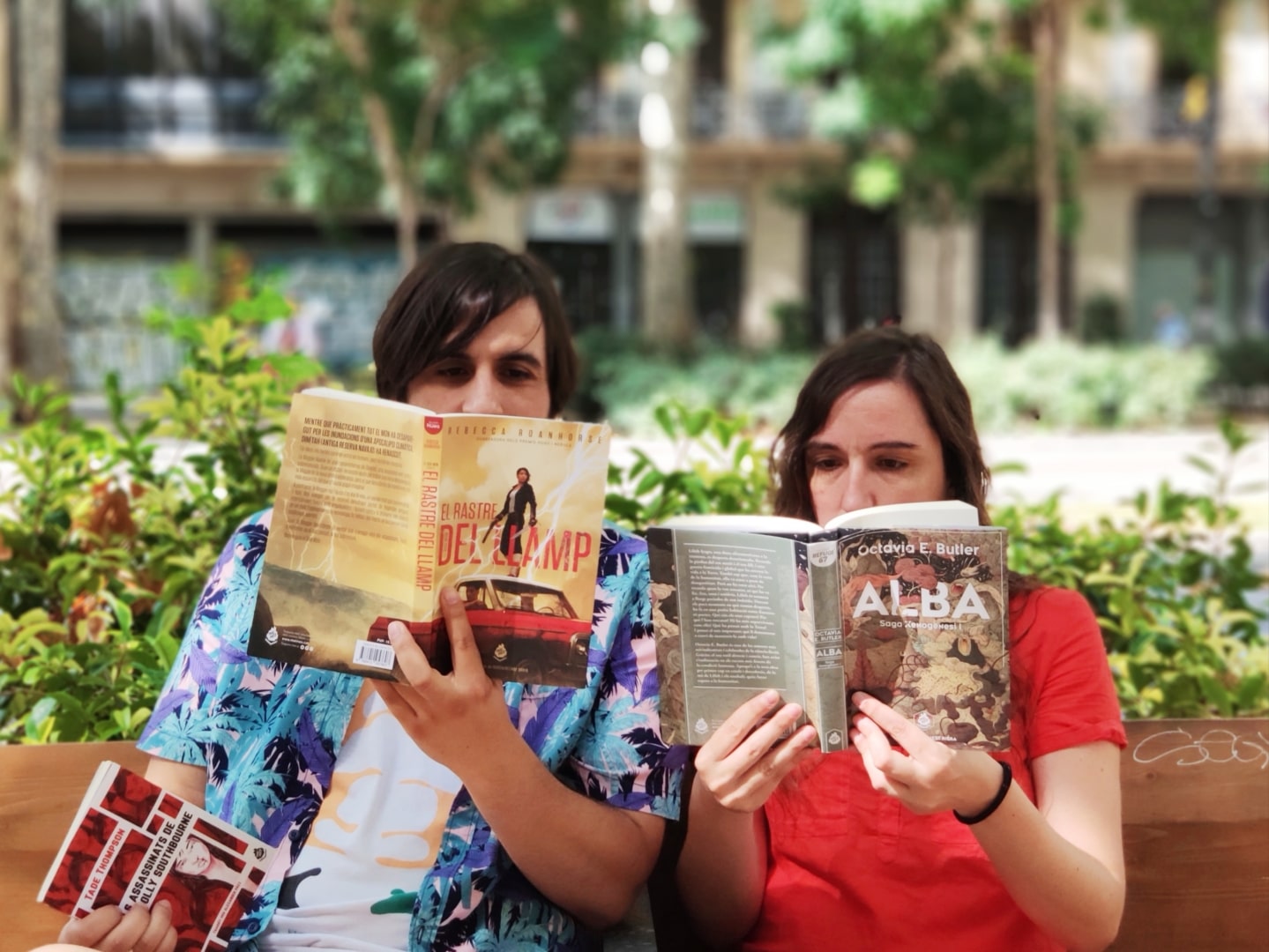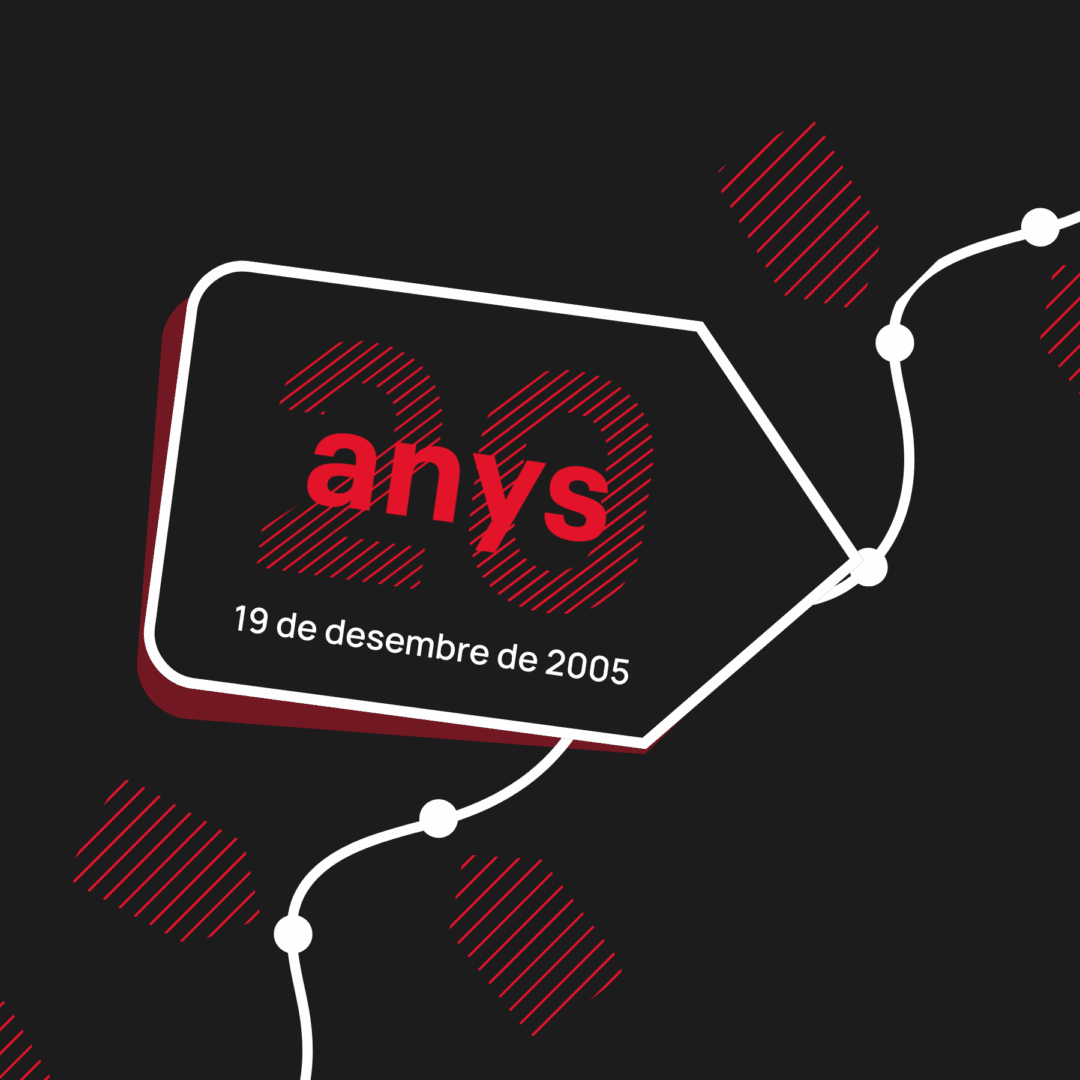“Science fiction enables you to explore new societies and new political projects”

Today, on Geek Pride Day, we are talking to Judit Terradellas and Sergio Pérez, the driving force behind the publishing company that specialises in science fiction, fantasy and horror in Catalan, Mai Més, a project that one can never tire of defending.
What motivated you to establish the publishing house Mai Més?
Judit Terradellas: We’ve been working in publishing for years, producing books that are more “normie” [more accessible to the general public]. And we noticed that the books we read in English were being translated into Spanish but not Catalan. Other publishers, such as Raig Verd or Males Herbes, had translated works by Ursula K. Leguin and Ray Bradbury, and some of the main publishers translated more specific titles, but we realised that there was no Catalan counterpart specialising in this genre, as was the case of companies such as Insólita in the Spanish-speaking realm. This is what made us decide to start our project.
Sergio Pérez: People say that the science fiction, fantasy and horror genres aren’t very successful here, that they don’t have many followers. We realised that this wasn’t the case. In Barcelona there’s actually a geek triangle [different blocks of buildings with shops dealing in comics and collectionism near Arc de Triomf], the Comic Fair, the Manga Fair… and everything is doing really well. We knew that the bare bones are there, but it isn’t structured around Catalan. We asked ourselves whether a wide range in Catalan would lead to migrations.
In fact, projects such as the Catalan Science Fiction and Fantasy Society (SCCFF) already exist. I suppose you were already involved in this…
JT: We’re deeply involved with this community. We took part in the second CatCon, and we’re also involved in portals such as Biblionauta or Les Rades Grises. We’ve got links and we form alliances. Our fear was that fans of the genre wouldn’t switch to Catalan. But that they did. If you offer this range then people respond, despite there being many different alternatives in Spanish and it being easy to switch language.
SP: We’ve gone way beyond our forecasts. This doesn’t mean we’re selling a lot of books, but that there are a lot of people who didn’t use to read in Catalan because they didn’t like type of literature available, but when they found works that they liked then they took the leap.
You define yourselves as a ‘freak’ publishing house…
SP: It’s a word that doesn’t mean anything. It has more derogatory connotations in English than in Catalan, which is why the term “geek” is more commonly used. Here it isn’t as harsh, and refers to a person who is passionate about certain things, fans of the series Game of Thrones, Star Wars, the Lord of the Rings, video games… a whole range of subcultures, certain types of contents such as Dragon Ball. We say loud and proud that we’re “freaks”, because we’re aware that you have to give up certain labels in Catalonia because they’re unpopular. It’s ridiculous. Saying it out loud right from the start and not giving this label up is a way of not hiding it. We’re “freaks”, and that’s fine.
JT: We want a “freak” culture in Catalan.
Earlier you gave me an example of two must-read authors of science fiction, Bradbury and Leguin, but this isn’t what you offer. You’re a bit more underground, aren’t you?
JT: We have a section of modern classics with authors such as Octavia Butler and China Miéville, but we found we were missing more modern authors. Publications in Catalan of authors who have books in the US related to video games, such as Cassandra Khaw, which could be turned into a TV series and that have been nominated for Hugo or Nebula awards, that we don’t have here. This is where we’ve focused, and this goes beyond Catalan, because Khaw and Rebecca Roanhorse, for example, aren’t published in Spanish. Or minor novels such as those by Tade Thompson aren’t even available in Spanish. That’s where we focus.
SP: Although authors such as Khaw actually are more underground, there are other more prestigious writers such as Miéville who are unknown here and are seemingly underground, but outside our area they’re really famous. We’re about to publish a work by Ted Chiang, Exhalation: Stories, which was chosen as one of the top ten reads of the year last year, and is one of Barack Obama’s favourites. This doesn’t make it very underground, although it’s true that it might seem like it in literary circles that are not very open to this type of literature.

Why the reference to the story The Raven by Edgar Allan Poe in the name of your publishing company? It’s not actually a “freak” reference as we’ve defined the word here.
JT: Different candidates came up when we were researching names. We chose “Mai més” (Never Again) as a way of saying “never again will we not have modern science fiction, fantasy and horror books in Catalan”. It also enables us to invoke other things, such as the Peter Pan’s Never Never Land, and the logo pays homage to Ray Bradbury [for his work Fahrenheit 451, a dystopia in which the common thread involves book burning]. We thought this name would let us defend what we were unable to find at the time on the Catalan scene.
SP: While we were choosing the name we attended some tutorials held by Barcelona City Council in support of cultural projects, and they always told us not to do books. We jokingly said: “Mai més libres!” (Never again books!). And that’s where the reference comes from, and its really quite relevant now that we also deal in horror.
JT: It was a provocation. A response to everyone who attended the Barcelona Activa tutorials from the publishing house RBA who told us that we shouldn’t deal in books, and who we told that it’s what we’ve always done and what we know how to do.
But you don’t just deal in these literary genres and impossible business adventures. You also declare yourselves to be feminists, integrators, ecologists, queer… How does this political commitment relate to your publishing business?
SP: We think it’s almost inherent to the genres we deal in. Particularly science fiction, but fantasy and horror too: they all include an in-depth analysis of our society. We don’t publish books to get rich, or as a great business and financial project, but as a vocation. And when you do something as a vocation you ask yourself how this project can help build a better society. The issues of migration or the climate emergency are things that modern authors discuss, and we had the choice of either not defending them, or going straight ahead and doing so.
JT: It’s important to defend these labels. They’re a part of us, it’s our point of view, and they’re important for changing our society. The authors who currently write this kind of literature are already pointing in this direction. Science fiction enables us to explore new societies and new political projects. And there are a lot of authors, which means you can dive right into the point of view of feminism.
SP: Laura Huerga from Raig Verd said that: Ursula K. Leguin defended the evasive quality of this literature. She allows you to release yourself from your own reality for a whole. This is one of the functions we defend in this literature.
What are the up-and-coming Catalan assets in these genres?
JT: Anthologies such as Extraordinàries by the publishers Males Herbes show that there’s a great deal of talent out there.
SP: You’ve got Irene Solà, who’s becoming really famous. Elisenda Solsona, Salvador Macip, Marc Pastor… and, looking back, there’s also Sánchez-Pinyol, with Cold Skin…
JT: Manuel de Pedrolo… there is a tradition that the norms have turned their back on…
SP: It’ hasn’t been defended as a genre but as literature in general. But we do have some good stories.
And finally, why did you sign up for the .cat domain?
SP: If we had to define our project in a few words, it would be: fantasy genres in Catalan. So when we were looking for a domain, the .cat was the first choice and what we believed would work best for our target audience.


